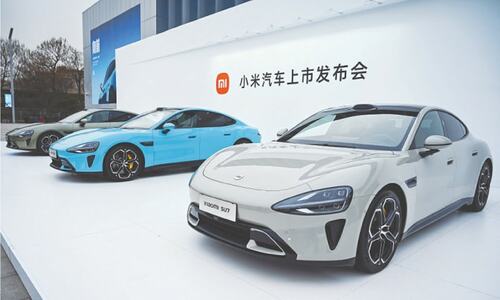BEIJING: On Thursday, the world’s largest automaker, Xiaomi, a Chinese consumer tech company, introduced its first electric car in Beijing, entering a highly competitive industry.
Due to purchase subsidies that ended in late 2022, China’s EV industry has expanded quickly in recent years. As a result, dozens of local automakers are fighting it out for market share in a highly competitive environment.
With the SU7 EV, Xiaomi CEO Lei Jun claims he is now putting his “reputation on the line” by taking on Elon Musk’s Tesla and Chinese automaker BYD. Xiaomi is well-known for its reasonably priced smartphones and home appliances.
According to Lei, the price of a base SU7 model will be 215,900 yuan ($29,868), as announced on Thursday night at a glamorous press briefing. Lei stated that “sound simulation” is a feature of the svelte and sporty SU7 that “recreates the thrill of driving a sports car” and that it will be offered in nine different colors.
It also has a ton of other gimmicks, like a mini-fridge and karaoke equipment.
At less than 500,000 yuan, Xiaomi claims to have the “best-looking, best-driving, and smartest car.”
According to Jefferies Financial Group Inc. analyst Johnson Wan, “the 200,000 to 250,000 yuan range, that actually is the most competitive segment in the China EV space at the moment,” Wan told Bloomberg.
At the press briefing on Thursday, Lei stated that his company’s first car was better than the American manufacturer’s sedan in certain areas and was on level with Tesla’s Model 3.
“I believe we can offer Model 3 users a better product,” he declared.
The third-largest smartphone manufacturer in the world, Xiaomi, has shaped its EV strategy with its experience in the industry.
The SU7’s pricing was influenced by the fact that, according to Lu Weibing, president of Xiaomi, the company’s premium smartphones were used by about 20 million people, as CNBC reported last month.
“I believe there will be a significant overlap between smartphone users and the initial buyers. Thus, it is our approach,” Lu remarked.
Competitive market
According to Abhishek Murali, senior electric vehicle analyst at Rystad Energy, “By entering the premium segment, Xiaomi can carve out a niche against established brands like Tesla and Nio.” The statement was made to AFP.
According to Murali, “Xiaomi can potentially offset the high manufacturing costs typically faced by EV startups by targeting affluent Chinese consumers with a premium EV.”
The world’s largest EV vendor, BYD, announced record yearly profits a few days prior to the SU7’s launch. BYD is pushing for a swift growth into Southeast Asian nations as well as countries in Latin America and Europe.
BYD CEO Wang Chuanfu recognized that things had not gone as planned for the year in a message that was included with the financial report.
“The recovery of automotive consumption was relatively lagging behind at the beginning of the year, caused by the changeover in promotional programs and market pricing fluctuations,” the author stated.








